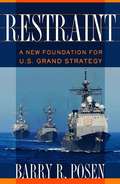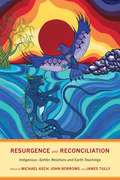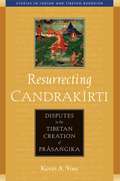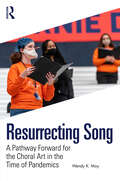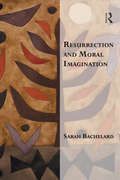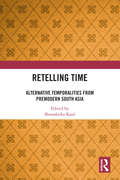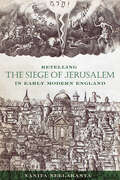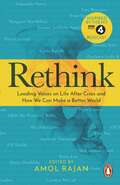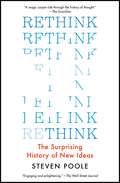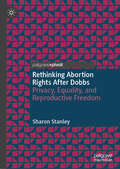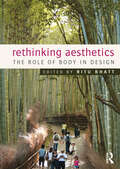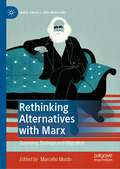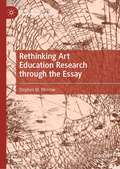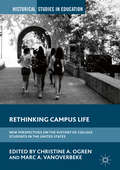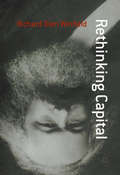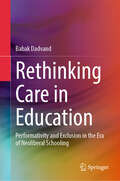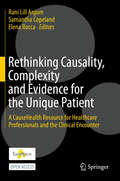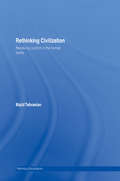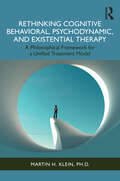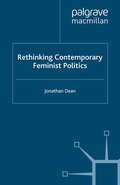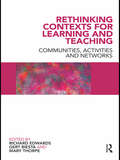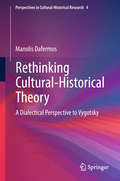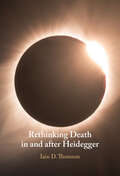- Table View
- List View
Restraint: A New Foundation for U.S. Grand Strategy
by Barry R. PosenThe United States, Barry R. Posen argues in Restraint, has grown incapable of moderating its ambitions in international politics. Since the collapse of Soviet power, it has pursued a grand strategy that he calls "liberal hegemony," one that Posen sees as unnecessary, counterproductive, costly, and wasteful. Written for policymakers and observers alike, Restraint explains precisely why this grand strategy works poorly and then provides a carefully designed alternative grand strategy and an associated military strategy and force structure. In contrast to the failures and unexpected problems that have stemmed from America's consistent overreaching, Posen makes an urgent argument for restraint in the future use of U. S. military strength. After setting out the political implications of restraint as a guiding principle, Posen sketches the appropriate military forces and posture that would support such a strategy. He works with a deliberately constrained notion of grand strategy and, even more important, of national security (which he defines as including sovereignty, territorial integrity, power position, and safety). His alternative for military strategy, which Posen calls command of the commons, focuses on protecting U. S. global access through naval, air, and space power, while freeing the United States from most of the relationships that require the permanent stationing of U. S. forces overseas. "
Resurgence and Reconciliation: Indigenous-Settler Relations and Earth Teachings
by James Tully Michael Asch John BorrowsThe two major schools of thought in Indigenous-Settler relations on the ground, in the courts, in public policy, and in research are resurgence and reconciliation. Resurgence refers to practices of Indigenous self-determination and cultural renewal whereas reconciliation refers to practices of reconciliation between Indigenous and Settler nations, such as nation-with-nation treaty negotiations. Reconciliation also refers to the sustainable reconciliation of both Indigenous and Settler peoples with the living earth as the grounds for both resurgence and Indigenous-Settler reconciliation. Critically and constructively analyzing these two schools from a wide variety of perspectives and lived experiences, this volume connects both discourses to the ecosystem dynamics that animate the living earth. Resurgence and Reconciliation is multi-disciplinary, blending law, political science, political economy, women's studies, ecology, history, anthropology, sustainability, and climate change. Its dialogic approach strives to put these fields in conversation and draw out the connections and tensions between them. By using “earth-teachings” to inform social practices, the editors and contributors offer a rich, innovative, and holistic way forward in response to the world’s most profound natural and social challenges. This timely volume shows how the complexities and interconnections of resurgence and reconciliation and the living earth are often overlooked in contemporary discourse and debate.
Resurrecting Candrakirti
by Kevin A. VoseThe seventh-century Indian master Candrakirti lived a life of relative obscurity, only to have his thoughts and writings rejuvenated during the Tibetan transmission of Buddhism. Since then, Candrakirti has been celebrated as offering the most thorough and accurate vision of Nagarjuna's view of emptiness which, in turn, most fully represents the final truth of the Buddha's teaching. Candrakirti's emptiness denies the existence of any "nature" or substantial, enduring essence in ourselves or in the phenomenal world while avoiding the extreme view of nihilism. In this view, our false belief in nature is at the root of our ignorance and is the basis for all mental and emotional pain and disturbance. For many Tibetan scholars, only Candrakirti's Middle Way entirely overcomes our false belief in inherent identity and, consequently, alone overcomes ignorance, delivering freedom from the cycle of uncontrolled death and rebirth known as samsara. Candrakirti's writings have formed the basis for Madhyamaka study in all major traditions of Tibetan Buddhism. In Resurrecting Candrakirti, Kevin Vose presents the reader with a thorough presentation of Candrakirti's rise to prominence and the further elaborations the Tibetans have made on his presentation of emptiness. By splitting Madhyamaka into two subschools, namely the Svatantrika and Prasangika, the Tibetans became pioneers in understanding reality and created a new way to define differences in interpretation. Resurrecting Candrakirti provides the historical and philosophical context necessary to understand both Madhyamaka and its importance to Tibetan Buddhist thought.
Resurrecting Democracy
by Luke BrethertonThrough a case study of community organizing in the global city of London and an examination of the legacy of Saul Alinsky around the world, this book develops a constructive account of the relationship between religious diversity, democratic citizenship, and economic and political accountability. Based on an in-depth, ethnographic study, Part I identifies and depicts a consociational, populist and post-secular vision of democratic citizenship by reflecting on the different strands of thought and practice that feed into and help constitute community organizing. Particular attention is given to how organizing mediates the relationship between Christianity, Islam and Judaism and those without a religious commitment in order to forge a common life. Part II then unpacks the implications of this vision for how we respond to the spheres in which citizenship is enacted, namely, civil society, the sovereign nation-state, and the globalized economy. Overall, the book outlines a way of re-imagining democracy, developing innovative public policy, and addressing poverty in the contemporary context.
Resurrecting Song: A Pathway Forward for the Choral Art in the Time of Pandemics
by Wendy K. MoyThrough a collection of extensive interviews with choral conductors, educators, singers, and professional leaders, this book documents the choral music community’s journey through crisis and change during the COVID-19 pandemic and aids in its rebuilding in a new era where COVID-19 is endemic.When the pandemic emerged in early 2020, the impact on choral music was immediate and devastating, as the act of gathering and singing together became a source of contagion and potential severe illness or death. Weaving together a wide range of first-person accounts, this book addresses the impact of the coronavirus pandemic on choral music across contexts including community choruses, professional choirs, children and youth choirs, school choirs, and choral organizations. In their own words, we hear how the community responded to the challenges and banded together to innovate, use technology in new ways, and generate changes to practice. The book also explores how the pandemic caused many directors to realize that they needed to create a more inclusive place of belonging in their rehearsals, and provides reflections on the philosophy of singing and creating a choral community.Documenting both pandemic experiences and the lessons learned from surviving and thriving, this book showcases the resilience of choral music and helps point the way to new directions for the choral community in the wake of the pandemic.
Resurrection and Moral Imagination (Transcending Boundaries in Philosophy and Theology)
by Sarah BachelardMoral life gathers its shape, force and meaning in relation to an underlying sense of reality, imaginatively conceived. Significant contemporary writing in philosophy appeals to the concept of ’transcendence’ to explore what is deepest in our moral experience, but leaves this notion theologically unspecified. This book reflects on the appeal to transcendence in ethics with reference to the Resurrection of Jesus. Bachelard argues that the Resurrection reveals that the ultimate reality in which human life is held is gracious, forgiving and reconciling, a Goodness that is ’for us’. Faith in this testimony transforms the possibilities of moral life, both conceptually and in practice. It invites our participation in a goodness experienced non-dualistically as grace, and so profoundly affects the formation of the moral self, the practice of moral judgement and the shape of moral concepts. From this perspective, contemporary philosophical discussion about 'transcendence' in moral thought is cast in a new light, and debates about the continuity between theological and secular ethics gain a thoroughly new dimension. Bachelard demonstrates that placing the Resurrection at the heart of our ethical reflection resonates with the deepest currents of our lived moral experience and transfigures our approach to moral life and thought.
Retelling Time: Alternative Temporalities from Premodern South Asia
by Shonaleeka KaulRetelling Time challenges the hegemony of colonial modernity over academic disciplines and over ways in which we think about something as fundamental as time. It reclaims a bouquet of alternative practices of time from premodern South Asia, which stem from worldviews that have been marginalized. These practices relate to a range of classical and vernacular genres including alaṃkāra, theravāda, yoga, rāmakathā, tasawwuf, āyāraṃga, purāṇa, trikā-tantra, navya-nyāya, pratyabhijñā, carita, kūṭīyāṭṭam and maṅgala kāvya. These represent multiple languages such as Sanskrit, Persian, Pali, Prakrit, Awadhi, Malayalam, Kannada, and Bengali, as well as diverse streams, from Hinduism, Jainism, Buddhism, and Sufi Islam to logic, yoga, tantra, theatre, and poetics. Retelling Time questions the modern Eurocentric belief in an empty, homogenous, abbreviated, secular and irreversible time. It proposes instead that that premodern South Asia invested time with cultural function and value, which ranged from the contingent to the transcendent, the quotidian to the cosmic, the fleeting to the eternal, and the social to the spiritual. Accordingly, time was reworked --- stretched, melded, collapsed, recursed, rolled over, and even extinguished. Sacred, social, aesthetic, scientific, fictional, historical, and performative South Asian traditions are seen here in conversation with one other, mediated by an ethical paradigm. Their collective challenge is to decolonize our ways of knowing and being. This book will be of interest to scholars of South Asian history, philosophy of history, anthropology, literature, Sanskrit, post colonial studies, cultural studies, studies of temporality and of the Global South.
Retelling the Siege of Jerusalem in Early Modern England: Narrating The Destruction Of 70 C.e. In Early Modern England (Early Modern Exchange)
by Vanita NeelakantaThis compelling book explores sixteenth- and seventeenth-century English retellings of the Roman siege of Jerusalem and the way they informed and were informed by religious and political developments. The siege featured prominently in many early modern English sermons, ballads, plays, histories, and pamphlets, functioning as a touchstone for writers who sought to locate their own national drama of civil and religious tumult within a larger biblical and post-biblical context. Reformed England identified with besieged Jerusalem, establishing an equivalency between the Protestant church and the ancient Jewish nation but exposing fears that a displeased God could destroy his beloved nation. As print culture grew, secular interpretations of the siege ran alongside once-dominant providentialist narratives and spoke to the political anxieties in England as it was beginning to fashion a conception of itself as a nation.Distributed for the University of Delaware Press
Rethink: How We Can Make a Better World
by Amol RajanAfter darkness, there is always lightIn a time of increasing uncertainty, Rethink offers a guide to a much-needed global 'reset moment', with leading international figures giving us glimpses of a better future after the pandemic. Each contribution explores a different aspect of public and private life that can be re-examined - from Pope Francis on poverty and the Dalai Lama on the role of ancient wisdom to Brenda Hale on the courts and Tara Westover on the education divide; from Elif Shafak on uncertainty and Steven Pinker on Human Nature to Xine Yao on masks and Jarvis Cocker on environmental revolution. Collectively, they offer a roadmap for positive change after a year of unprecedented hardship.Based on the hit BBC podcast, and with introductions by presenter and journalist Amol Rajan, Rethink gives us the opportunity to consider what a better world might look like and reaffirms that after darkness there is always light.RETHINK List of contributorsWHO WE ARECarlo Rovelli - Rethinking HumanityPope Francis - Rethinking PovertyPeter Hennessy - Rethinking DemocracyAnand Giridharadas - Rethinking CapitalismJared Diamond - Rethinking a Global ResponseZiauddin Sardar - Rethinking NormalityThe Dalai Lama - Rethinking Ancient WisdomC.K. Lal - Rethinking InstitutionsJarvis Cocker - Rethinking an Environmental RevolutionClare Chambers - Rethinking the BodySteven Pinker - Rethinking Human NatureTom Rivett-Carnac - Rethinking HistoryJonathan Sumption - Rethinking the StateWHAT WE DODavid Skelton - Rethinking IndustryEmma Griffin - Rethinking WorkCaleb Femi - Rethinking EducationGina McCarthy - Rethinking ActivismTara Westover - Rethinking the Education DivideKwame Anthony Appiah - Rethinking the Power of Small ActionsCharlotte Lydia Riley - Rethinking UniversitiesK.K. Shailaja - Rethinking DevelopmentSamantha Power - Rethinking Global GovernanceKT Tunstall - Rethinking the Music IndustryRebecca Adlington - Rethinking the Athlete's LifeBrenda Hale - Rethinking the CourtsNisha Katona - Rethinking HospitalityKatherine Granger - Rethinking the OlympicsDavid Graeber - Rethinking JobsJames Harding - Rethinking NewsCarolyn McCall Rethinking TelevisionHOW WE FEELMohammad Hanif - Rethinking IntimacyH.R. McMaster - Rethinking EmpathyCarol Cooper - Rethinking Racial EqualityPaul Krugman - Rethinking SolidarityAmonge Sinxoto - Rethinking SafetyReed Hastings - Rethinking TogethernessKang Kyung-wha - Rethinking AccountabilityLucy Jones - Rethinking BiophiliaColin Jackson - Rethinking Our Responsibility for Our HealthMirabelle Morah - Rethinking OurselvesNicci Gerrard - Rethinking Old AgeBrian Eno - Rethinking the WinnersJude Browne - Rethinking ResponsibilityElif Shafak Rethinking UncertaintyHOW WE LIVEAmanda Levete - Rethinking How We LiveNiall Ferguson - Rethinking ProgressDavid Wallace-Wells - Rethinking ConsensusMargaret MacMillan - Rethinking International CooperationHRH The Prince of Wales - Rethinking NatureOnora O'Neill - Rethinking Digital PowerMatthew Walker - Rethinking SleepHenry Dimbleby - Rethinking How We EatEliza Manningham-Buller - Rethinking Health InequalityPascal Soriot - Rethinking Medical Co-operationXine Yao - Rethinking MasksGeorge Soros - Rethinking DebtMariana Mazzucato - Rethinking ValueDouglas Alexander - Rethinking Economic DignityWHERE WE GOPeter Frankopan - Rethinking AsiaStuart Russell - Rethinking AIDeRay McKesson - Rethinking the ImpossibleV.S. Ramachandran - Rethinking BrainsSeb Emina - Rethinking TravelAaron Bastani - Rethinking an Aging PopulationRana Foroohar - Rethinking DataAnthony Townsend - Rethinking Robots
Rethink: The Surprising History of New Ideas
by Steven PooleA brilliant and groundbreaking argument that innovation and progress are often achieved by revisiting and retooling ideas from the past rather than starting from scratch--from The Guardian columnist and contributor to The Atlantic.Innovation is not always as innovative as it may seem. This is the story of how old ideas that were mocked or ignored for centuries are now storming back to the cutting edge of science and technology, informing the way we lead our lives. This is the story of Lamarck and the modern-day epigeneticist whose research vindicated his mocked 200-year-old theory of evolution; of the return of cavalry use in the war in Afghanistan; of Tesla's bringing back the electric car; and of the cognitive scientists who made breakthroughs by turning to ancient Greek philosophy. Drawing on examples from business to philosophy to science, Rethink shows what we can learn by revisiting old, discarded ideas and considering them from a novel perspective. From within all these rich anecdotes of overlooked ideas come good ones, helping us find new ways to think about ideas in our own time--from out-of-the-box proposals in the boardroom to grand projects for social and political change. Armed with this picture of the surprising evolution of ideas and their triumphant second lives, Rethink helps you see the world differently. In the bestselling tradition of Malcolm Gladwell, Poole's new approach to a familiar topic is fun, convincing, and brilliant--and offers a clear takeaway: if you want to affect the future, start by taking a look at the past.
Rethinking Abortion Rights After Dobbs: Privacy, Equality, and Reproductive Freedom
by Sharon StanleyThis book offers a novel account of the normative foundations of abortion rights informed by political theory and feminist theory. Stanley revisits the debate between privacy and equality as rationales for abortion rights that erupted after Roe v. Wade. First, Stanley argues that we can reconceptualize privacy along feminist lines, contra its feminist critics. Second, this reconceptualization allows us to see privacy and equality as essential allies and supplements to each other. When operating in tandem, privacy and equality provide a powerful theoretical and practical foundation not only for abortion rights but also for an expansive vision of reproductive justice informed by an intersectional understanding of the reproductive burdens endured by those multiply marginalized by gender, race, and class. This reproductive justice framework is the most promising basis for a powerful post-Dobbs political coalition seeking to restore and greatly expand the promise of reproductive freedom symbolically represented by Roe.
Rethinking Aesthetics: The Role of Body in Design
by Ritu BhattRethinking Aesthetics is the first book to bring together prominent voices in the fields of architecture, philosophy, aesthetics, and cognitive sciences to radically rethink the relationship between body and design. These essays argue that aesthetic experiences can be nurtured at any moment in everyday life, thanks to recent discoveries by researchers in neuroscience, phenomenology, somatics, and analytic philosophy of the mind, who have made the correlations between aesthetic cognition, the human body, and everyday life much clearer. The essays, by Yuriko Saito, Juhani Pallasmaa, and Richard Shusterman, among others, range from an integrated mind-body approach to chair design, to Zen Buddhist notions of mindfulness, to theoretical accounts of existential relationships with buildings, to present a full spectrum of possible inquiries. By placing the body in the center of design, Rethinking Aesthetics opens new directions for rethinking the limits of both essentialism and skepticism.
Rethinking Aesthetics: The Role of Body in Design
by Ritu BhattRethinking Aesthetics is the first book to bring together prominent voices in the fields of architecture, philosophy, aesthetics, and cognitive sciences to radically rethink the relationship between body and design. These essays argue that aesthetic experiences can be nurtured at any moment in everyday life, thanks to recent discoveries by researchers in neuroscience, phenomenology, somatics, and analytic philosophy of the mind, who have made the correlations between aesthetic cognition, the human body, and everyday life much clearer. The essays, by Yuriko Saito, Juhani Pallasmaa, and Richard Shusterman, among others, range from an integrated mind-body approach to chair design, to Zen Buddhist notions of mindfulness, to theoretical accounts of existential relationships with buildings, to present a full spectrum of possible inquiries. By placing the body in the center of design, Rethinking Aesthetics opens new directions for rethinking the limits of both essentialism and skepticism.
Rethinking Alternatives with Marx: Economy, Ecology and Migration (Marx, Engels, and Marxisms)
by Marcello MustoThis book presents a Marx that is in many ways different from the one popularized by the dominant currents of twentieth-century Marxism. The dual aim of this edited volume is to contribute to a new critical discussion of some of the classical themes of Marx’s thought and to develop a deeper analysis of certain questions to which relatively little attention has been paid until recently.Contributions of globally renowned scholars, from nine countries and multiple academic disciplines, offer diverse and innovative perspectives on Marx’s points of view about ecology, migration, gender, the capitalist mode of production, the labour movement, globalization, social relations, and the contours of a possible socialist alternative. The result is a collection that will prove indispensable for all specialists in the field and which suggests that Marx’s analyses are arguably resonating even more strongly today than they did in his own time.
Rethinking Art Education Research through the Essay (Palgrave Studies in Educational Futures)
by Stephen M. MorrowThis book explores the pedagogical applications of critical thinking in art education and scholarship. In the first part of the book, the author delves into the ways that arts-based educational research has incorporated critical thinking in order to illuminate the context for the subsequent study. The second half of the book focuses on the essay as a genre used in creative nonfiction and film in order to enact the concept of critical thinking in art education. In this way, the book sheds light on a new landscape of thinking arts education and thinking scholarship through the essay that is practiced in creative nonfiction and cinema.
Rethinking Campus Life: New Perspectives on the History of College Students in the United States (Historical Studies in Education)
by Christine A. Ogren Marc A. VanOverbekeThis edited volume explores the history of student life throughout the nineteenth and twentieth centuries. Chapter authors examine the expanding reach of scholarship on the history of college students; the history of underrepresented students, including black, Latino, and LGBTQ students; and student life at state normal schools and their successors, regional colleges and universities, and at community colleges and evangelical institutions. The book also includes research on drag and gender and on student labor activism, and offers new interpretations of fraternity and sorority life. Collectively, these chapters deepen scholarly understanding of students, the diversity of their experiences at an array of institutions, and the campus lives they built.
Rethinking Capital
by Richard Dien WinfieldThis book develops a comprehensive systematic economic theory, conceiving how the dynamic of market relations generates an economy dominated by the competitive process of individual profit-seeking enterprises. The author shows how, contrary to classical political economy and contemporary economics, the theory of capital is an a priori normative account properly belonging to ethics. Exposing and overcoming the limits of the economic conceptions of Hegel and Marx, Rethinking Capital determines how the system of capitals shapes economic freedom, jeopardizing the very rights in whose exercise it consists. Winfield thereby provides the understanding required to guide the private and public interventions with which capitalism can be given a human face.
Rethinking Care in Education: Performativity and Exclusion in the Era of Neoliberal Schooling
by Babak DadvandThis book examines some of the most pressing challenges facing care, equity, and inclusion in education in the age of globalising neoliberal capitalism. Drawing on empirical data collected using a case study of a government secondary school in a low socio-economic status suburb in Melbourne, Australia, this book interrogates the impacts of dominant performative policies and practices on students who have more complex needs, or are from socio-economically marginalised backgrounds. It reviews these policies and practices, which are increasingly driven by the discourses of learning achievement and outcomes measured via high-stakes testing. This book examines how these developments have created (in)visible geographies of exclusion for marginalised students in mainstream schools. It uses notions of belonging, ethics of care and emotional labour as theoretical tools to provide critical analyses of the practices that differentiate and divide among students. This book’s narrative approach is built around recounting ‘deep stories’ of the participants, their dilemmas and predicaments; it synthesises intimate narrative accounts with research-informed analysis and discussions.
Rethinking Causality, Complexity and Evidence for the Unique Patient: A CauseHealth Resource for Healthcare Professionals and the Clinical Encounter
by Rani Lill Anjum Samantha Copeland Elena RoccaThis open access book is a unique resource for health professionals who are interested in understanding the philosophical foundations of their daily practice. It provides tools for untangling the motivations and rationality behind the way medicine and healthcare is studied, evaluated and practiced. In particular, it illustrates the impact that thinking about causation, complexity and evidence has on the clinical encounter. The book shows how medicine is grounded in philosophical assumptions that could at least be challenged. By engaging with ideas that have shaped the medical profession, clinicians are empowered to actively take part in setting the premises for their own practice and knowledge development. Written in an engaging and accessible style, with contributions from experienced clinicians, this book presents a new philosophical framework that takes causal complexity, individual variation and medical uniqueness as default expectations for health and illness.
Rethinking Civilization: Resolving Conflict in the Human Family (Rethinking Globalizations #Vol. 3)
by Majid TehranianRethinking Civilization offers an alternative view of human civilization in a globalizing age. Majid Tehranian analyses the transition from nomadic, to agrarian, commercial, industrial, and digital civilizations and argues that the growing gaps among the five major civilizations have led to terror operating as a form of global communication. This new book explores the uneven pace of development of human societies, particularly in the last two centuries, and argues that this is leading to a global civil war. Taking a long-term historical perspective, and developing a model that explains how empires, resistance, and civilizations have evolved alongside major technological breakthroughs in history, Tehranian offers a multi-cultural and multi-disciplinary analysis of the phenomenon. Seeking to counter the current rhetorical trends, Tehranian reconceptualizes "civilization" to make it a useful analytical rather than ideological category. defines the varieties of terrorism, including structural, nuclear, state, opposition, messianic, and anomic. addresses the contemporary problems of global governance and the evolution of international relations. traces the evolution of global communication from orality to literacy, print, electronic, and digital modes. forecasts the emerging problems of encounters among the five civilizations. This unique and original volume will be of great interest to students and researchers of globalization, international relations, peace studies and sociology.
Rethinking Cognitive Behavioral, Psychodynamic, and Existential Therapy: A Philosophical Framework for a Unified Treatment Model
by Martin H. KleinThis book presents a new integrative paradigm for psychotherapy that brings together cognitive behavioral, psychodynamic, and existential approaches within a coherent philosophical framework.Drawing from the history of philosophy it explores how metaphysical thought reflects both the intellectual spirit of the times and the psychosocial development of the individual. The model suggests that, just as ideas evolve through history, patients move through metaphysical stages—realism, idealism, and existentialism—throughout their therapeutic journey. By understanding and working within a patient’s underlying metaphysical orientation, therapists can more thoughtfully align and integrate their interventions. While many experienced clinicians already draw flexibly from different traditions, this model gives structure and language to that intuitive integration. It encourages deeper reflection, clearer therapeutic direction, and a more deliberate engagement with each patient’s worldview. It also opens a space for both therapist and patient to examine the assumptions that shape their ways of being and relating. Grounded in real-world clinical work yet informed by philosophical insight, this book offers a model that is accessible, nuanced, and practical.Rethinking Cognitive Behavioral, Psychodynamic, and Existential Therapy will appeal to therapists, students, and anyone interested in a more integrated and reflective approach to psychological treatment and human development.
Rethinking Contemporary Feminist Politics: Shared Values In Uncertain Times (Gender and Politics)
by J. DeanRethinking Contemporary Feminist Politics puts forward a timely analysis of contemporary feminism. Critically engaging with both narratives of feminist decline and re-emergence, it draws on poststructuralist political theory to assess current forms of activism in the UK and present a provocative account of recent developments in feminist politics.
Rethinking Contexts for Learning and Teaching: Communities, Activites and Networks
by Richard Edwards Gert Biesta Mary ThorpeNow that learning is seen as lifelong and lifewide, what specifically makes a learning context? What are the resultant consequences for teaching practices when working in specific contexts? Drawing upon a variety of academic disciplines, Rethinking Contexts for Learning and Teaching explores some of the different means of understanding teaching and learning, both in and across contexts, the issues they raise and their implications for pedagogy and research. It specifically addresses What constitutes a context for learning? How do we engage the full resources of learners for learning? What are the relationships between different learning contexts? What forms of teaching can most effectively mobilise learning across contexts? How do we methodologically and theoretically conceptualise contexts for learning? Drawing upon practical examples and the UK’s TLRP, this book brings together a number of leading researchers to examine the assumptions about context embedded within specific teaching and learning practices. It considers how they might be developed to extend opportunity by drawing upon learning from a range of contexts, including schools, colleges, universities and workplaces.
Rethinking Cultural-Historical Theory: A Dialectical Perspective To Vygotsky (Perspectives In Cultural-historical Research Ser. #4)
by Manolis DafermosThis book is an exploration of science in the making. It offers readers the opportunity to critically reflect on the process of development of Vygotsky's research program from the perspective of dialectics, focusing on the dramatic process of building and rebuilding cultural historical theory. Vygotsky's creative and dramatic journey is no less important than the concrete results of his research. An epistemological and historical investigation of the formulation of cultural historical theory sheds light on the process of knowledge production and reveals hidden dimensions of creativity in science.
Rethinking Death in and after Heidegger
by Iain D. ThomsonIain D. Thomson is renowned for radically rethinking Heidegger's views on metaphysics, technology, education, art, and history, and in this book, he presents a compelling rereading of Heidegger's important and influential understanding of existential death. Thomson lucidly explains how Heidegger's phenomenology of existential death led directly to the insights which forced him to abandon Being and Time's guiding pursuit of a fundamental ontology, and thus how his early, pro-metaphysical work gave way to his later efforts to do justice to being in its real phenomenological richness and complexity. He also examines and clarifies the often abstruse responses to Heidegger's rethinking of death in Levinas, Derrida, Agamben, Beauvoir, and others, explaining the enduring significance of this work for ongoing efforts to think clearly about death, mortality, education, and politics. The result is a powerful and illuminating study of Heidegger's understanding of existential death and its enduring importance for philosophy and life.
